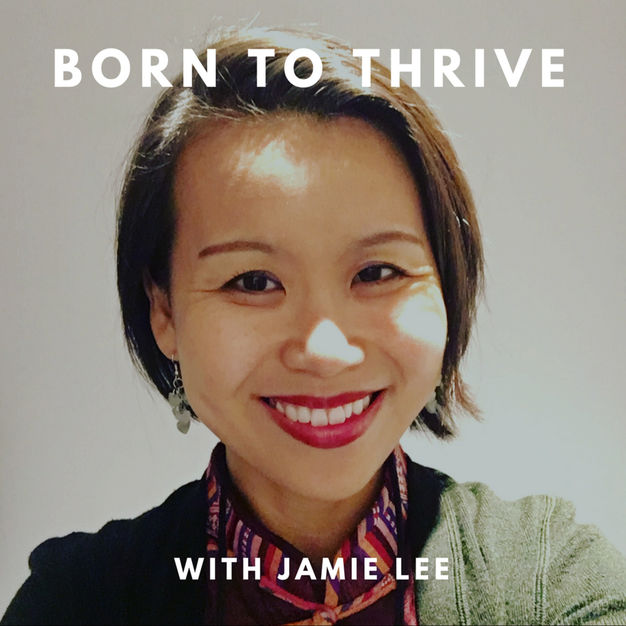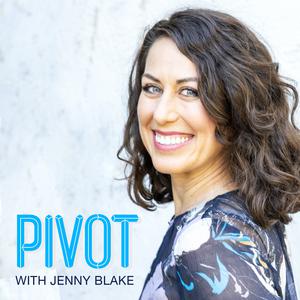
Born to Thrive with Jamie Lee
Born to Thrive with Jamie Lee
Welcome to the Born to Thrive with Jamie Lee podcast, where I present ideas, tips and tools to help ambitious women become bolder, braver and better paid.
- 21 minutes 48 secondsEp 63. Strategic Conversations Part 2: Root of All Behavior
This is part two of a five-part podcast series on leading Strategic Conversations so you can improve your results and relationships at work. Check out the first episode here.
In this episode, I explain what's at the root of all behavior. When you understand what drives people's behavior and what drives your behavior, it is so powerful, because now you know how to influence yourself and others.
What drives your actions? What drives the behavior of your negotiation counterpart?
You'll learn:
1. What emotion is and the role it plays in driving our behavior
2. The difference between neutral circumstances and thoughts, and how we become biased
3. The thinking that generated $50K then $100K in income for me
If you enjoyed this and would like to learn more about my six-week coaching program, please apply here to set up a quick consult over Zoom.
10 May 2019, 8:24 pm - 27 minutes 11 secondsEp. 62 Strategic Conversations Part 1 - Planning with Future Focus
I coach smart women to get promoted and better paid without throwing anyone under the bus, manipulating people, or burning themselves out.
How?
I teach simple but powerful concepts that help my clients engage in strategic conversations with a mindset of self-confidence and authentic power.
Over five podcast episodes, I'll be teaching each of these five simple but powerful concepts that you can immediately implement into your life and career so you can get bolder, braver, and better paid.
This episode is about the first and most important concept: Planning with Future Focus.
Three questions I ask my clients to help them with Future Focus is:
1. WHO are you in the process of becoming?
2. WHAT results do you want in the future?
3. HOW can you be your Future Self now?
If you enjoyed this and would like to learn more about my six-week coaching program, please email me at [email protected] to set up a quick consult over Zoom.
3 May 2019, 4:07 pm - 30 minutes 42 secondsEp. 61 How to Negotiate Budget Cuts and Unconscious Bias with Amy Auton-Smith
I met Amy Auton-Smith at Catalyst Conference in March 2019. She shared a salary negotiation story of how she successfully negotiated a win-win solution when the budget for her position was significantly reduced. I immediately knew I'd love to have her share both her negotiation story and the story of how she started her startup on the podcast.
Amy is a long-term champion of equality and diversity. As CEO of FairFrame, she's working to bring cutting-edge tech and diversity and inclusion research outcomes together to help mitigate the effects of unconscious bias at work. Amy is passionate about helping employers and leaders everywhere to ensure that everyone can achieve their true potential at work.
Check out Fairframe.io or on Crunchbase.
24 April 2019, 6:41 pm - 33 minutes 25 secondsEp. 60 Two Simple Reminders that Improve Negotiation Outcomes: Dr. Julia Bear
According to research, women's monetary negotiation outcomes improved when they did two things before negotiating:
1. Recalling the last three times they were assertive
2. Imagining that they are negotiating for a friend.
In this episode, I interview one of the co-authors of this research, Julia Bear.
We explored this research, why what and how we think impact our negotiation results, and how we can apply research like this to improve our negotiation outcomes.
Julia Bear is an Associate Professor in the College of Business at Stony Brook University. Dr. Bear’s research focuses on the influence of gender on negotiation outcomes, as well as conflict management in organizations. In her research, she investigates what factors, both individual and situational, influence the gender gap typically seen in negotiation outcomes, and how an understanding of these factors can help to reduce this gender gap in both initiation of negotiation and negotiation performance.
Here's the research (PDF): Negotiating Femininity
Other resources mentioned include:
HBR article: 10 Myths about Negotiating Your First Salary
Book: Women Don't Ask
10 April 2019, 1:59 pm - 27 minutes 47 secondsEp. 59 On Money, Family, and Passion: Eric Kohner Coaches Jamie Lee Using The Five Knowledge Centers
According to Ivy Business Journal, “Executives and HR managers know that coaching is the most potent tool for creating lasting personal change.”
I think coaching is something everyone should get to test drive and experience first hand to really understand the impact of it.
But if you can't hire a coach (or find a coach-in-training who will coach you for free) the second best thing might be for you to sit in on a coaching session.
That’s why earlier this week, I invited leadership coach Eric Kohner, who trained me to coach at the Coaches Training Institute to coach me on my own money beliefs using his leadership framework called the Five Knowledge Centers.
The Five Knowledge Centers reflect:
1. Head - reason
2. Heart - love
3. Gut - intuition and vision
4. Groin - passion and drive
5. Hands - action
Eric Kohner is an internationally recognized executive coach and keynote speaker. He founded eKCosystem, a global corporate training company dedicated to bringing HUMAN BEING into business, because “in today’s highly competitive world, the new hard skills are the heart skills.”
Learn more about Eric's work here: www.ekcosystem.com
Or reach him directly via email here: [email protected]
You can reach me directly via email too: [email protected]
22 March 2019, 10:11 pm - 35 minutes 48 secondsEp. 58 How to Tame Your Inner Mammal with Dr. Loretta Breuning
When I first encountered Dr. Loretta's work on Youtube, I was delighted because she has created a valuable body of work that helps us understand the why and how behind our animal impulses that don't always support our human aspirations to be better, to thrive, and to be at peace with ourselves and with the world.
In this special interview, Dr. Loretta helps us see that there is nothing wrong with us -- even if our brains would have us think otherwise because of evolution, neurotransmitters, and socialization.
Loretta Breuning is Founder of the Inner Mammal Institute and Professor Emerita of Management at California State University, East Bay. She’s the author of Habits of a Happy Brain, and many other books that have been translated into Spanish, Russian, Chinese, Arabic, French, Turkish and German.
Learn more at InnerMammalInstitute.org
To learn more about me (or to sign up for the upcoming free webinar), come to JamieLeeCoach.com
15 March 2019, 9:13 pm - 1 hour 33 secondsEp. 57 The Human Brain: How Neurotransmitters Impact Negotiation Behavior
As a negotiation geek, I love thinking about how the brain impacts our negotiating behaviors. The brain is a fascinating organ. It's the human computer that can process a trillion bits per second. Yet scientists say we've only barely begun to understand how the brain works.
We know a few basic things, like how the brain evolved over millions of years and how some chemical messengers (or neurotransmitters) relay information that trigger thoughts and emotions that drive our behavior. In this episode, I talk about three neurotransmitters: Serotonin, Oxytocin, and Cortisol.
My intention is to raise our awareness about our brains and the impact of these neurotransmitters so we can understand:
- Our own impulses at the negotiating table,
- The why behind how other people react to your ask, and
- How to create better strategies for success with all this in mind.
8 March 2019, 1:26 pm - 21 minutes 36 secondsEp. 56 You've Gotta Ask
In this episode, I share insights on negotiation and leadership from the book Success Affirmations: 52 Weeks for Living a Passionate and Purposeful Life.
In week 17, the affirmation is:
I am asking for what I want and need with a positive expectation that I will get a YES.
Some of the useful tips on asking include:
- Ask as if you expect to get it
- Assume you can
- Ask someone who can give it to you...
I share my own thoughts, insights, and tips to help you ask for what you want so that you can become bolder, braver, and better paid.
If you'd like to check out details about the upcoming mastermind, come over to https://www.jamieleecoach.com/mastermind
Or email me at [email protected]
15 February 2019, 9:22 pm - 1 hour 3 minutesEp. 55 How to Generate Self-Confidence Without Faking Anything
We all know self-confidence helps you get more of what you want. But how do you get confident if you haven't yet gotten what you want?
There's a better way than "fake it till you make it," pretending to be something you're not, or blowing yourself up like a blowfish...
The best way is to generate confidence inside of you, by you and for you.
This is something I help my clients do so they can become bolder, braver, and better paid.
This episode is a replay of a webinar where I shared five simple steps anyone can master to generate self-confidence.
If you'd like to watch and not just listen to the replay, come to www.jamieleecoach.com or email me at [email protected].
8 February 2019, 5:47 pm - 23 minutes 46 secondsEp. 54 Why do you assume the worst case scenario?
"I'm afraid of losing all my money and becoming a bag lady."
"I think they are going to criticize and rebuke me."
"They will pigeonhole me for what I've done, not what I can do."
Does your brain assume the worst case scenario when it comes to your career and interactions with other people?
If so, what's the impact of assuming the worst? What's the upside and what's the downside?
In this episode, I share:
- my personal experience of assuming the worst and living in survival mode
- two of the "worst case scenarios" that actually happened in my life
- some biases I'm choosing on PURPOSE so that I can thrive, not just survive.
If you enjoy this podcast, you'd enjoy joining me at my upcoming webinar. Come register at www.jamieleecoach.com
Or write me for suggestions, thoughts, and more: [email protected]
1 February 2019, 4:49 pm - 20 minutesEp. 53 How to Set Boundaries Without Giving Up Power
Clients often tell me that they struggle with setting boundaries at work. The feelings associated with this are resentment, victimhood, and powerlessness.
Here's the good news: It's totally possible to set and maintain boundaries without giving up personal power when you take 100% responsibility for your own emotions and actions. This leads to both self-empowerment and healthy relationships.
In this episode, you'll learn
- How other people and external circumstances don't create our feelings,
- How emotional dependency leads to manuals that disempower, and
- The difference between a manual and boundary
If you'd like to register for the upcoming free webinar or to get in touch with me for a trial coaching session, email me at [email protected].
If you'd like to read past podcast transcripts, go to https://www.jamieleecoach.com/podcast
25 January 2019, 6:16 pm - More Episodes? Get the App
Your feedback is valuable to us. Should you encounter any bugs, glitches, lack of functionality or other problems, please email us on [email protected] or join Moon.FM Telegram Group where you can talk directly to the dev team who are happy to answer any queries.
 Find Your Dream Job: Insider Tips for Finding Work, Advancing your Career, and Loving Your Job
Find Your Dream Job: Insider Tips for Finding Work, Advancing your Career, and Loving Your Job
 Pivot with Jenny Blake
Pivot with Jenny Blake
 Negotiate Anything
Negotiate Anything
 Radical Candor: Communication at Work
Radical Candor: Communication at Work
 WSJ Secrets of Wealthy Women
WSJ Secrets of Wealthy Women
 #SECURETHESEAT
#SECURETHESEAT